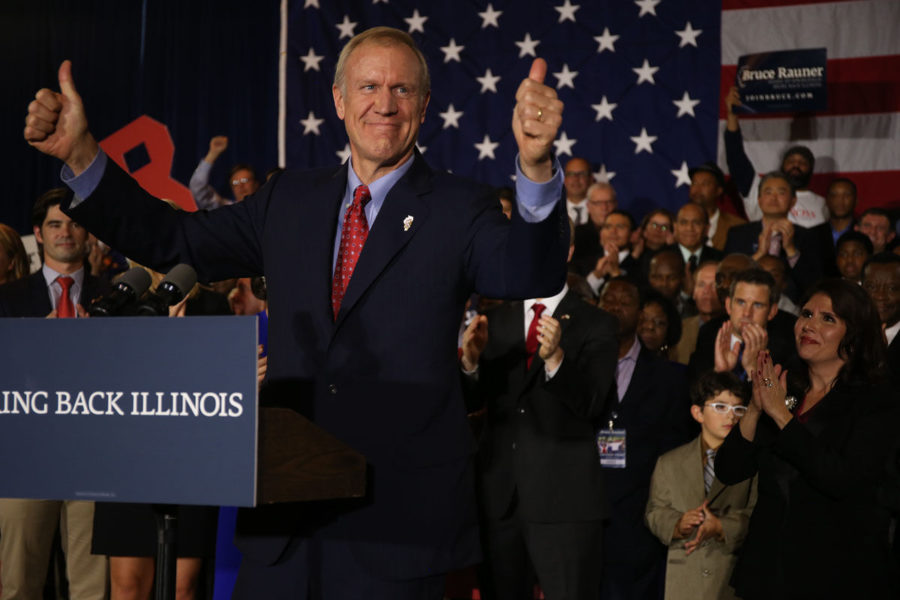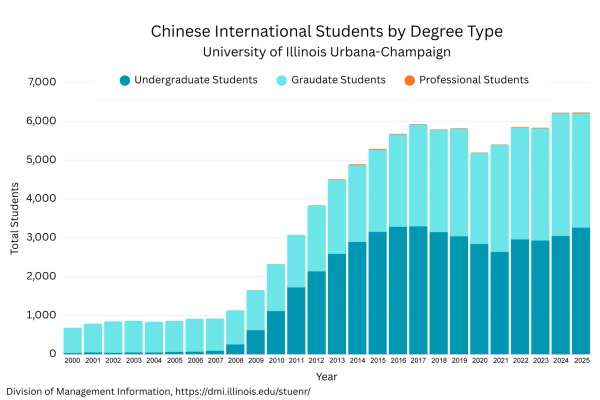The $100 million dollar election: Political contributions in Illinois gubernatorial election shatters previous record
Nov 10, 2014
Last updated on May 11, 2016 at 12:10 a.m.
Nearly $100 million was raised in Illinois’ most recent gubernatorial election, more than double the amount that was raised in the 2010 election.
Republican winner Bruce Rauner contributed more than $27 million of his personal wealth to his candidacy over the course of his campaign. Overall, his campaign raised nearly $66 million by Election Day, more than double the Quinn campaign’s total of just over $30 million.
“Bruce Rauner’s personal wealth was probably the key catalyst in this case,” said Brian Gaines, professor at the Institute of Government and Public Affairs. “Rauner, because he’s worth … more than $100 million, and he essentially pledged he wouldn’t be outspent.”
Money from labor and service unions, political parties and associations and large individual contributors from inside and outside the state poured into the race, making this gubernatorial election the most expensive in Illinois history.
Get The Daily Illini in your inbox!
“In turn, unions have been kind of lukewarm about Quinn and unhappy with him,” Gaines said. “(They) decided they liked Rauner even less, and they ended up ponying up money, and we sort of entered into this arms race dynamic.”
Kent Redfield, emeritus professor of political science at the University of Illinois in Springfield, said it was Rauner’s anti-union message during the Republican primary that riled the groups to contribute tens of millions of dollars to Quinn.
“Part of that was about the positions that Rauner was taking and Quinn being the opposite of that,” Redfield said. “It was also about Illinois’ symbolic value, being Obama’s home state.”
Rising levels of money in Illinois’ electoral process is part of a much larger national trend in which record-breaking political expenditures are the new normal. Limits on these expenditures have been gradually reduced or eliminated over the last three decades, allowing for larger and larger contributions to be made.
What does more money in politics mean for democracy?
What is still the subject of debate are the implications that money has on the democratic process.
For example, a candidate may be popular because they raised significantly more money than his opponent, allowing for the purchase of more advertising and voter outreach. Conversely, a candidate could be attracting large donations because they were already popular to begin with.
“Political scientists have been studying this a long time, and we’re still arguing amongst ourselves about exactly how much weight to put on money,” Gaines said. “In most cases, it’s not really the money that’s driving the incumbent winning; the money is as much a signal of the incumbent’s advantage as it is the source of the advantage.”
Redfield said that rising levels of political spending could have devastating consequences for democracy, especially when considering who is making these contributions.
“Another thing that has changed is the concentration of wealth at the top of the economic system,” Redfield said. “You have got a lot more super-rich who are participating in politics. If you look at giving, not just to campaigns but overall, Rauner contributed about $29 million to Illinois politics, Ken Griffin about $5.8 million and Richard Uihlein (both Chicago businessmen) about $4 million. You put (Chicago businessman) Fred Eychaner in there, who is on the Democratic side, you’ve got four people putting $40 million into Illinois politics.”
According to the Center for Responsive Politics, in the 2012 election cycle, just 0.4 percent of the population made one or more political contributions over $200, but comprised 63.5 percent of the total value of all individual contributions. If a majority of a candidate’s funds come from such a small percent of the population, it may inevitably lead campaigns to cater to these donors.
Voters in the 2014 election appear to believe that this is in fact the case. An exit poll conducted by the Associated Press found that nearly two–thirds of the electorate believes that the country’s economic system favors the wealthy.
“There’s a danger there in distorting the political process by overwhelming the process with money,” Redfield said. “Money is corrupting the electoral process by the distortions that it introduces into the process.”
When campaigns or outside organizations spend their money on political advertisements, they must disclose whom their donors are so that the public knows where the money came from. However, groups classified as 501(c)4 organizations by the IRS do not have to reveal the identity of their donors, and disclosure laws have come under fire in the Supreme Court.
“Currently, when these large amounts of money are spent, there has to be a disclaimer … and there has to be a disclosure of who is spending the money,” said Steven Seitz, associate professor of political science. “(Justice) Thomas has already attacked those two, and so if the Court turns to that level, there would essentially be no protections.”
There are very few standards for campaign finance corruption, Seitz said. By the time the Supreme Court ruled on McCutcheon v. FEC, which eliminated the aggregate limits for political expenditures, the only standard remaining was the notion of “quid pro quo” corruption, which defines corruption very narrowly, Seitz said.
“If the slow erosion of checks on (political) expenditures continues, how they got into Congress is going to become very, very important,” Seitz said.
What motivates a political donor?
Seitz said an individual citizen’s reasons for contributing to a candidate for office can often be vastly different from what motivates a corporation or PAC to make a political expenditure.
“You’ve got motivation on the part of ordinary people to give to causes they like, or something like that, and that is typically motivated by no expectation of return except that particular issue or that particular policy,” Seitz said. “A corporation is going to expect a lot more than that.”
Corporate donors, Seitz said, have an ideological orientation as well, but it does not drive them as much as it does for an ordinary citizen. Corporations who contribute large sums of money to campaigns or PACs, he said, view their money as an investment and expect to see a return.
“If buying a candidate succeeds, or if being able to get the candidate on the ballot, if I can succeed in doing that and eventually get more people into Congress, I’m going to have essentially Congress now defining problems the way I want them to define them,” Seitz said.
Offsetting the influence of large corporate and private donors may be a challenge, but not outside the realm of possibility. Redfield said that maintaining and expanding donor disclosure laws along with increasing political participation could be a potential solution.
Gaines said that gerrymandering can have an even greater influence over the outcome of elections than large contributions, a practice that both political parties have engaged in across the country.
“In the end, I think redistricting is more important,” Gaines said. “Once the map is drawn, there are a bunch of races that are predetermined by the shape of the district, and in turn, the money follows the likely winner.”
Josh can be reached at [email protected].






